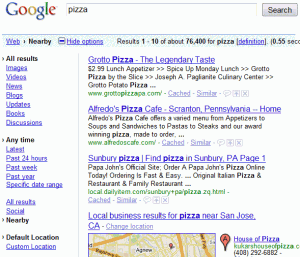Search Engine Optimization 2011
Not too long ago, Wired magazine ran an article by Chris Anderson and Michael Wolff entitled “The Web is Dead, Long Live the Internet.” In the introduction to that article the authors write, “Two decades after its birth, the World Wide Web is in decline, as simpler, sleeker services – think apps – are less about the searching and more about the getting.”
If this is true, finding your way to the top of the search engines won’t be quite so crucial, in terms of business success. The authors note that people may spend their entire day on the Internet and never really search the Web. Specific apps for email, social sites, news and business resources make it unnecessary to type and search.
Anderson and Wolff urge the skeptics among us not to toss this off as “a trivial distinction.” They call the new model “semi-closed platforms” that use the Internet as a transportation device. But there is no basic need for a browser to display pages. The bottom line is it’s “a world Google can’t crawl.”
What does it mean to rank #1 on the major search engines in 2010 and beyond? Is it as important as being the “big dog” a few years ago? Or, as some believe, is it not quite as important as in the past?
Off to the Races?
 The year 2010 may be remembered as the period of time when use of the Web and Internet changed significantly. What change, you may well ask? It seems obvious that if the majority of people are starting to fine-tune their Web use to the point of using only a handful of specific apps, the key factor is going to be speed.
The year 2010 may be remembered as the period of time when use of the Web and Internet changed significantly. What change, you may well ask? It seems obvious that if the majority of people are starting to fine-tune their Web use to the point of using only a handful of specific apps, the key factor is going to be speed.
Several industry observers have started to focus on page-load speed as one of two or three major factors for Web site success. For example, professionals in this field are urging Web designers and administrators to offer thumbnails of images so that the visitor doesn’t have to wait for a full-size image to load. Give the viewer the option to select the larger image. It’s a simple step.
In keeping with this trend toward almost-instant gratification, Google has come forward to emphasize page speed as a key factor. After all, for Google to be successful millions of Web users around the world must continue to search. One of the primary “enemies” of the old search pattern is the mobile device.
As cell phones and other devices take on tasks formerly completed only on a powerful desk computer, the need to search will be in decline. Sites will be developed for mobile devices and for the specific applications that work best on the mobile device.
Take the Local
 As we discuss this major change in Web use we should also consider this thing called the local search. In simple terms, being #1 worldwide will mean less if a viewer limits the search (and use) to fewer sites. For example, businesses of all types may start to limit their marketing to sectors such as Google Places or to Hotpot (interesting name). This last item is a ratings tool as well as a recommendation engine for Google Places. It’s designed to focus on local service, based on visits and recommendations from friends and other users.
As we discuss this major change in Web use we should also consider this thing called the local search. In simple terms, being #1 worldwide will mean less if a viewer limits the search (and use) to fewer sites. For example, businesses of all types may start to limit their marketing to sectors such as Google Places or to Hotpot (interesting name). This last item is a ratings tool as well as a recommendation engine for Google Places. It’s designed to focus on local service, based on visits and recommendations from friends and other users.
Will search-engine optimization maintain its place as a key to Web site success? The answer could be “yes” and “no” together. Relevant, reliable content that is useful on a consistent basis will still put sites near the top of the priority list. One good example for incorporating the speed idea into the mix is using WebP images that will load faster than bulky JPEGs.
Here are some reasons why we should start using WebP:
- Faster user experience
- Reduced bandwidth and hosting cost
- Overall improvement of the World Wide Web
Perhaps one of the most important ideas Webmasters, developers and marketers can take from this discussion comes from Anderson and Wolff, authors of the Wired article. “The fact that it’s easier for companies to make money on these platforms only cements the trend. Producers and consumers agree: The Web is not the culmination of the digital revolution.”
A Few More Thoughts
Listing the key items for WebP use and including the emphasis on making money makes the argument for page speed quite strong. However, WebP won’t be an industry-wide standard immediately. Most people will continue to use JPEG or another popular format in the near future. But designers and administrators should give serious thought to using thumbnails to reduce load time.
As for the idea of making money on the Web, we might go back to the old real estate mantra “location, location, location.” Make sure your Web content is placed properly and the page-to-page connections are efficient. Add the local ingredient to your Web marketing to secure your place in a defined area.
Here’s a sobering thought for the doubters out there. The Wired article points out that a 1997 cover story in that magazine was already urging readers to “kiss your browser goodbye.” The emphasis for the future, according to this theory, was going to be on applications for specific purposes and a Web that was getting closer to “out of control.”
Walled gardens in which users were controlled by the provider certainly didn’t prove to be the success model. Google seemed to have “it!” But now it seems that even this game-changing business model wasn’t the final answer. Stay tuned.







